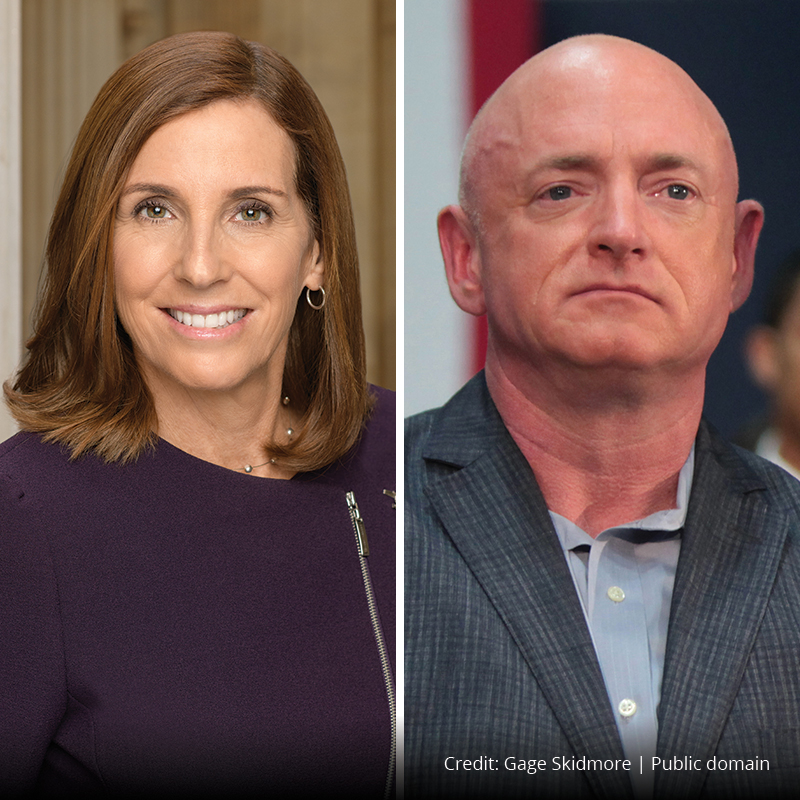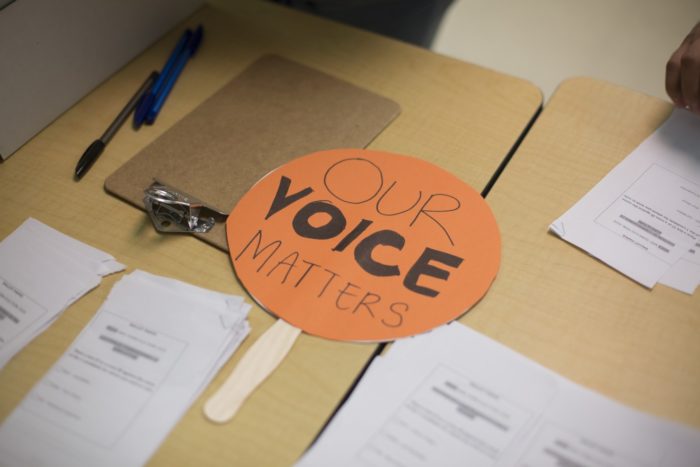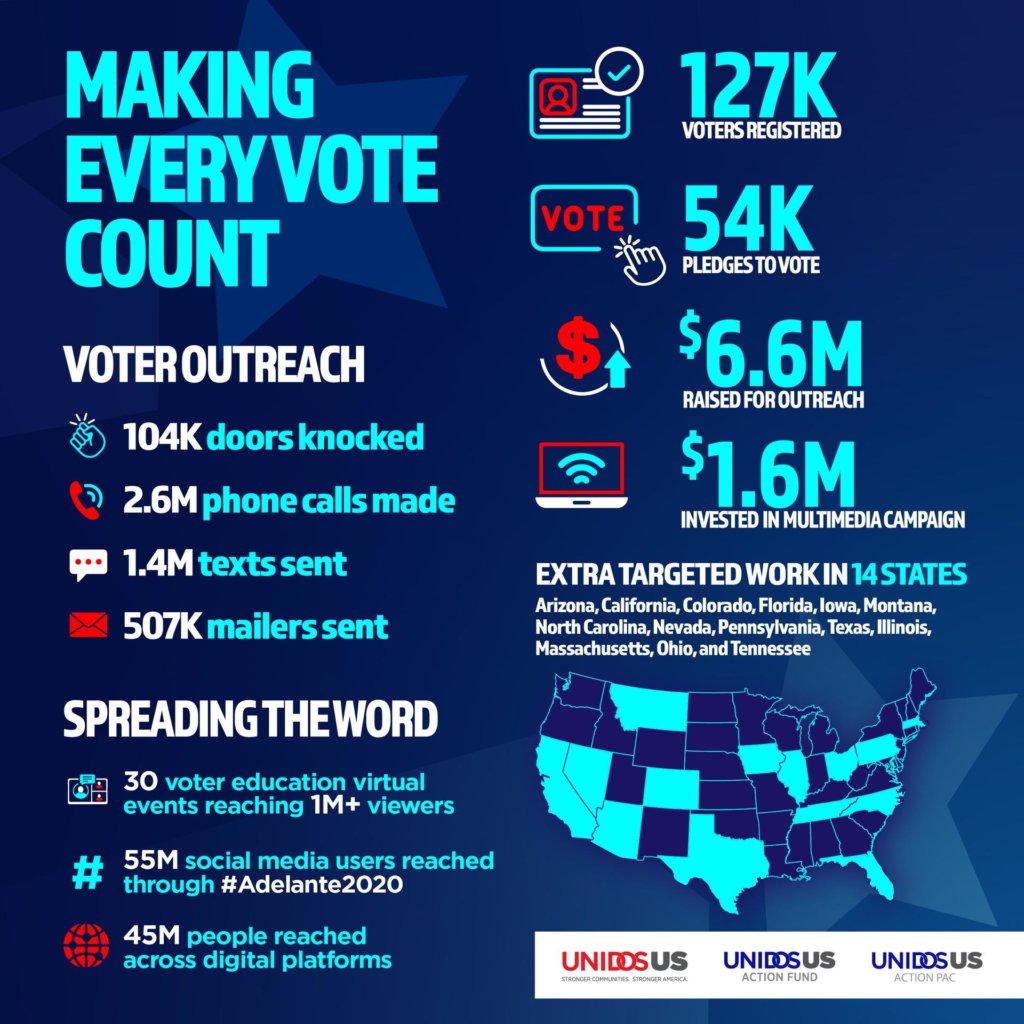Five questions Latino voters needed answers to at the Arizona Senate debate—but didn’t get

Last night’s Senate debate in Arizona was an opportunity for candidate Mark Kelly and Senator Martha McSally to make their case to Arizona voters and show where they stand on COVID recovery and other issues facing the people of Arizona and the nation. With this key Senate race entering its final weeks, and in state where a large share of the electorate is Latino, the debate represented a critical moment to appeal to the state’s Latino voters and speak to their concerns.
Based on a poll of Latino voters that we conducted with SOMOS, UnidosUS watched the debate hoping to hear five questions reflecting Latino voters’ priorities in the state, which both candidates needed to address to catch Latinos’ attention.
We will be in the key state of #Arizona this week meeting with Latino voters and leaders. @JMurguia_Unidos kicked off today with @phoenikera @LUCHA_AZ @AZHCCMOnica @LupitaHightower and @ArizonaEA. Thank you for your leadership! pic.twitter.com/MsSaclUmC8
— UnidosUS (@WeAreUnidosUS) October 6, 2020
Arizona Latinos should be pleased that the debate was not a repeat of the presidential debate; it was more substantive, policy-focused, and the debate moderators were more challenging of the candidates. That said, Latino voters want to hear more from the candidates than character attacks, and want to hear the candidates touch on specific issues affecting their lives. While some topics certainly did cover meaningful issues like the pandemic and health care, the answers often missed the mark. Here are the questions and specific points we hoped they would touch on:
What steps are being taken to meaningfully engage Latino voters, particularly young Latino voters in Arizona?
This got zero attention. There wasn’t a single question asked about voting, let alone about Latino voters, and the debate was almost completely devoid of any mention of Latinos at all—a glaring oversight for a state where Hispanics make up almost one in three residents.
Latino voters won’t support candidates who don’t reach out to them. It’s that simple. Most Latino voters in Arizona consistently report that neither party has contacted them or courted them for their vote. Candidates and parties need to abandon tired stereotypes about Latinos, like that they’re single-issue voters who only care about immigration. Latinos may care more about issues than parties, but immigration isn’t the only thing on their minds.
The Latino electorate in Arizona wants to see candidates that value diversity and bring people together, who are willing to work on both sides of the aisle to govern. The top three priorities for Latino voters this year are all related to the pandemic: COVID response, the cost of health care, and high rates of unemployment.
In addition to an effective COVID response, Latino voters want to see leaders who will:
- Modernize our outdated immigration system and provide a path to citizenship for hardworking immigrants who have made their lives here.
- Build on the success of the Affordable Care Act to make quality health coverage affordable and accessible to all.
- Expand the Earned Income Tax Credit and Child Tax Credit to all families regardless of citizenship status.
- Provide access to nutrition and rental and mortgage support so people can put food on the table and stay in their homes.
- Ensure our schools have the resources and supports they need so everyone is safe, and all students can succeed.
RELATED: Make a plan to vote today
AIRING TONIGHT: Don’t miss this powerful documentary on the high-stakes effort to get out the Latino vote in the 2020 election. https://t.co/CtKAWcwITI
— UnidosUS (@WeAreUnidosUS) October 6, 2020
What have candidates done or will do to ensure that all Arizonians have access to testing, treatment, and vaccines regardless of their race, ethnicity, or citizenship status during the pandemic?
Another missed opportunity. Latinos have been disproportionately affected by the coronavirus pandemic, getting sick and dying in numbers far greater than many other ethnic groups based on population. Latinos make up around 30% of the population with COVID-19 and more than 17% of all U.S. deaths. These figures are tragic, considering that Latinos only account for 18% of the total population. Latinos are also overrepresented among the essential workers helping us all survive during the pandemic. So, to not have any questions asked about COVID treatment or vaccine is more than disappointing.
The effects of the pandemic have exposed longstanding disparities that Latinos and their families face, having been locked out of the federal and state social safety net. The federal and state response to the current crises will widen inequality if the COVID response fails to reach all families in need, especially with regard to testing, treatment, and an eventual vaccine.
- Kelly deserves credit for his attempts to inject comments about the importance of providing relief to Americans who are suffering the health and economic impacts of the coronavirus pandemic. But there were no specifics about how to make sure relief can get to the most vulnerable in Arizona, where nearly 32% of the population is Latino.
- McSally touted her vote for the CARES Act, mentioned the impact on business owners, and did mention Hispanic entrepreneurs, to her credit. But the relief provided by this bill was uneven, and her record in attempting to provide relief to Hispanic small business owners or families left out was not mentioned.
RELATED: How we’re responding to the pandemic
What have candidates done or will do to fight for additional federal stimulus and to ensure that all families/workers in Arizona benefit?
This was never directly addressed—a surprising omission given that President Trump had earlier in the day halted negotiations until after the election. Kelly did try to raise the issue a few times that the Senate has not acted while rushing on Supreme Court nominee Judge Amy Coney Barrett. But McSally tended to pivot away into vague generalities and the debate moved on. Meanwhile, responding to COVID-19 is the top issue on the minds of Latino voters in Arizona. Not surprising given they have been hit particularly hard by job and income loss, and many did not get access to unemployment insurance and other relief. In a recent poll, 45% of Latinos in Arizona reported experiencing loss in Arizona.
What’s the plan to ensure that children from low-to-moderate income families, those with special needs, or English learners, get the attention and resources they need to get back on track and graduate high school ready for college?
This was another topic that got zero attention. In fact, the topic of education—from preschool to grad school—didn’t come up at all. Meanwhile 80% of Latino voters polled in Arizona in August expressed concerns about their children learning in schools.
- Distance learning is not reaching Latino students equitably. There may be no one-size-fits-all solution to this challenge, but our policymakers need to follow the science and prioritize the health and safety of students, teachers, and their families.
Remote learning has exposed the major digital divide in our country, with one in three Latino households lacking high-speed internet, and 17% lacking a computer, both essential tools for learning during the pandemic. If left unaddressed, this will inevitably lead to learning loss, wider achievement gaps, and a rollback of the progress Latino students and English learners have made to date. The pandemic may have disrupted the educational experience for our most vulnerable students, but the clock has not run out on Congress to legislate on this issue and provide funding to support students’ learning needs.
Given President Trump’s decision to nominate Judge Amy Barrett to the Supreme Court, what are candidates’ proposals or plans to protect families from a potential adverse decision by the Court regarding the Affordable Care Act and cover more children in Arizona, as the pandemic continues to unfold?
This was the one question that did get asked, more or less, and it quickly devolved into a familiar debate over Obamacare.
McSally repeatedly said she would protect people with preexisting conditions—as did Kelly—but without any specifics. “We will always protect preexisting conditions,” McSally noted. However, she did not explain satisfactorily her voting record on repeal and replace of the Affordable Care Act, a point guaranteed to be noted by fact-checkers. And she did not address the senselessness of efforts to destroy the Affordable Care Act in the midst of a global health pandemic. It’s imperative that the government ensure that everyone living in the United States is eligible for quality, affordable coverage. Also, protecting public health by expanding free access to COVID-19 testing, treatment, and vaccines regardless of immigration status is more crucial now than ever.
Kelly attempted to use a question about the Supreme Court to focus voters’ attentions on what’s at stake with Barrett’s nomination, given that the Affordable Care Act will be before the Court just a few days after Election Day. He connected her nomination to the fact that, if confirmed and seated before Election Day, she could rule against the law and strip millions of people of their health insurance. McSally responded by saying Republican senators should confirm Barrett if only, essentially, because they can.
The nation’s health care system has been under political attack since 2016, and today there are 80,000 Latino children in Arizona without health coverage during a pandemic. The important question is what will they do provide more affordable health coverage, and how will they fight to address racial and ethnic health disparities that are contributing to the fact that Hispanics make up at least 45% of the COVID cases in Arizona.
What’s next?
This initial debate was an opportunity for the candidates to make their case and argue their points, face-to-face, in front of the voters. At a minimum, Latino voters in Arizona ought to take away that each would take a dramatically different approach to working with and supporting a potential future Trump administration, and polls suggest this is meaningful to those voters. Assuming Latinos will vote against hate and discrimination isn’t enough to sway the millions of voters ready to cast ballots. As our poll and these questions show, Latinos need something to vote for, not against.
Let’s talk about voting by mail or absentee voting, as it might be called in your state. Yes, it’s safe, secure and easy! Follow these steps. pic.twitter.com/hbL8LZqUEa
— UnidosUS (@WeAreUnidosUS) October 4, 2020


